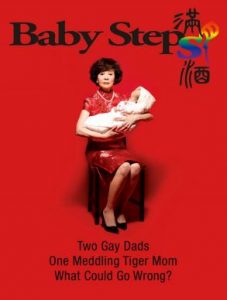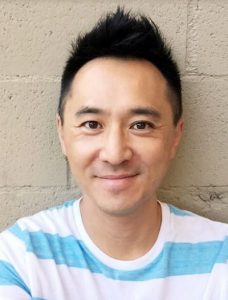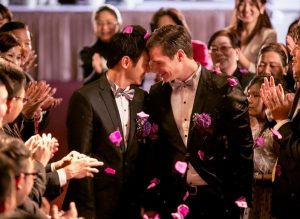Baby Steps Trailer from Barney Cheng on Vimeo.
The topography of Asian LGBTQ cinema is as diverse and as uneven as any site-specific genre. The films of the 48 nations, six states and just over 4 billion people reflect various stages of cinematic self-actualization that range from lurid and sentimental to haunting and profound. For every struggling-gay-man-who-doesn’t-want-to-hurt-his-weepy-mother-girlfriend-sister that comes out of the Philippines with impunity, we can still find Wong Kar-wai’s seminal 1997 picture Happy Together.
But it is neither fair nor appropriate to impose upon a country’s storytelling traditions our own versions of what makes cinema real or approachable. Take, for example, Macho Dancer, a heavyhanded snapshot of life behind the steamy outposts of gay clubs and gay living. The film, directed by Lino Brocka and released in 1988 was, for its time, a frank depiction of gay live in the ultra-conservative, Roman-Catholic Philippines. The film went on to nab two awards for its actors and holds a permanent place in the archives of the Museum of Modern Art.
 But if there is no litmus test to apply to a cinematic endeavor, how then are we to have a frame of reference as to whether a picture is good or not? Take Barney Cheng’s well-received 2015 family drama Baby Steps. While the release notes state that the film was seminal to a discussion that led to overturning the ban on same-sex marriage in Taiwan, the film still suffers from some narrative glitches; why is Tate, Dan’s boyfriend, all but lacking a backstory? We know virtually nothing about him. Ya-Lei Kuei – who play’s Dan’s mother as Grace Geui – is beside herself over Dan’s gayness but seems conveniently unfazed when she learns that Dan is trying to have children through the surrogacy process. In fact, most of the important secondary characters – Tate, Mr. Lin and Mickey – seem to serve only as convenient plot points. But, again, is it right, or even appropriate to force everyone to see a film through a Western lens. Viewers will have to see if Baby Steps succeeds on its own merits or not.
But if there is no litmus test to apply to a cinematic endeavor, how then are we to have a frame of reference as to whether a picture is good or not? Take Barney Cheng’s well-received 2015 family drama Baby Steps. While the release notes state that the film was seminal to a discussion that led to overturning the ban on same-sex marriage in Taiwan, the film still suffers from some narrative glitches; why is Tate, Dan’s boyfriend, all but lacking a backstory? We know virtually nothing about him. Ya-Lei Kuei – who play’s Dan’s mother as Grace Geui – is beside herself over Dan’s gayness but seems conveniently unfazed when she learns that Dan is trying to have children through the surrogacy process. In fact, most of the important secondary characters – Tate, Mr. Lin and Mickey – seem to serve only as convenient plot points. But, again, is it right, or even appropriate to force everyone to see a film through a Western lens. Viewers will have to see if Baby Steps succeeds on its own merits or not.
San Diego LGBT Weekly: This was a very personal story and probably very hard for you to tell knowing how many people would view it with their own particular biases. But I have to ask, how did becoming a gay surrogate factor into your relationship with you mom? Was it simply a narrative device that merely helped move the story along?

Barney Cheng: I came across a story about a gay couple from Israel, traveling around the globe, working with egg donors in America, surrogates in India, in order to have their baby. I thought that was a compelling story, and it inspired me to come up with the concept for Baby Steps. While the relationship between my mother and me is very real in the film, the surrogacy part is fictional. I did do a lot of research about the topic and interviewed many couples that went through the process. I wanted to make this movie because the issues are very relevant and important, especially what’s happening in our world today.
Surrogacy is important not only for LGBT couples and individuals, but also for families that cannot have children due to various reasons. It’s a complex topic that relates to issues of class, nationality, gender, sexuality, and I wanted to explore that in the movie. We live in a global world, and immigrants are valuable parts of our society, like the Mickey character, the Indonesian surrogate in the movie.
What did your real mom think of the finished product?
Before Baby Steps, my mother was always uncomfortable talking about my personal life. None of her friends knew that I am gay. They would always ask if I had a girlfriend or when I planned to get married. This film was inspired by my mother’s inability to come out to her friends and my longing for her acceptance. During the theatrical release of Baby Steps in Taiwan, my mother joined me on a TV talk show to promote the film. On national television, my mother shared my coming-out story and her struggles. She invited all of her friends to see the film in theater, and led a group of friends to attend rallies in support LGBT and marriage equality in Taiwan. Through the film, my mother “came out” to her friends. Art imitates life, but sometimes art shapes life. Baby Steps gave my mother and me the opportunity to connect.
You’ve described Grace Guei, who plays your fictional mom, as Asia’s Meryl Streep? That’s a pretty big “get” for a small gay indie, no? Describe how you were able to involve Ms. Guei in your production. Had you worked with her before?
She was in Ang Lee’s The Wedding Banquet. I loved that movie and her performance in particular. I pitched Baby Steps to her, and we talked about how Ang Lee’s The Wedding Banquet was a Taiwanese gay man’s coming-out story. Baby Steps, on the other hand, is a coming-out story of a Taiwanese mother with a gay son. She was intrigued.
What’s most important to you as a filmmaker in telling a story?
Authentic, real and finding ways to keep the audience engaged. I also wanted to tell impactful stories that empower people.
Your film was critical to the advancement of gay rights in Taiwan; many argue it was the casus belli that lead to the legalization of same-sex marriage in Taiwan. What’s that piece of history in your name feel like? I’m guessing pretty friggin’ amazing.

Marriage equality activists in Taiwan referenced the film during their discussions on same-sex marriage. However, I don’t think it’s the movie that caused the legalization of gay rights. Saying that would be discounting the hard work of all the incredible people and passionate forces that contributed to the miraculous movement in Taiwan. I’m glad that the film captured the cultural Zeitgeist in Taiwan, and I’m proud that it empowered people to be authentic and keep fighting for our rights.
What was it like directing yourself? I guess the nice thing is you could always fire yourself if you were unhappy with your performance.
I would do a scene, then take off the “actor” hat and put on the “director” hat. Walk over to the monitor to review what we’d just filmed. Give adjustment notes to cast and crew. Then quickly go back to the scene. Stay calm. Breathe. And do it all over again. We did this for every single shot that I was in. It was crazy.
An actor’s natural inclination is to always focus on him or herself. For this to be a good movie, I knew that I needed to work against that narcissistic inclination. It was extremely difficult. I constantly reminded myself to review not only my own acting but also other elements in the scene. I constantly reminded myself. Constantly. Every. Single. Take.
For more information on Baby Steps go here. Baby Steps is available on DVD, Blu-ray, and digital platforms by Gravitas Ventures.











